Rob Nunn's Blog: Interesting Though Elementary, page 24
September 3, 2018
Interesting Interview: Ashley Polasek
Oh boy, are you in for great interview this month! Ashley Polasek, Ph.D., took time out of her extremely busy schedule to answer some questions about the interests we all share in Sherlockiana.

Ashley has been published in a number of Sherlockian texts including The Baker Street Journal, "Dancing to Death," "About Sixty: Why Every Sherlock Holmes Story is the Best" and way too many to list here. She was also co-editor of "Sherlock Holmes: Behind the Canonical Screen" and "A Plum Assignment: Discourses on P.G. Wodehouse and His World." A member of The Adventuresses of Sherlock Holmes and The Baker Street Babes, hardly a day passes without Sherlockiana being a part of her life.
How do you define the word “Sherlockian”?
I’m ecumenical when it comes to our beloved enthusiasm (or, as I like to call myself, Sherlocumenical), so the only Sherlockian I feel it’s my place to define is me. For me, being a Sherlockian means holding a deep affection for the Sherlock Holmes character, participating in and contributing to our community, and enjoying the fellowship of other Sherlockians. As far as I’m concerned, anyone who calls themselves “Sherlockian” is one, and is welcome to join me in that fellowship.
How did you become a Sherlockian?
Although I’d been reading the Canon and assiduously watching adaptations for some time, I feel like I became a Sherlockian when I found the community. That happened when I was 23 and found a web forum called Holmesian.net. I lived on that forum every day for upwards of a year. The atmosphere was welcoming, the denizens diverse, and the conversation utterly delightful. When I decided to pursue my PhD in England, I arranged a meet-up of members of the forum in London while I was over to have my interview with my prospective supervisor. Three months later, I attended my first BSI weekend, and I haven’t missed one since—I’ll be attending my tenth in January. Although the forum no longer exists, I have maintained treasured friendships made there. In fact, my husband and I have gone on long holidays the UK, US, and even Italy with a couple I met through the forum. I credit Holmesian.net with teaching me how to be a Sherlockian.

How did you become a professional Sherlockian?
Professional Sherlockian. Hardly seems possible, does it? It was a fortuitous confluence of events, really. Having done my BA in radio/tv/film and my MA in English with a focus on Victorian literature, I decided to write my MA thesis on adaptations of The Hound of the Baskervilles. I may have gone another route, but the point during my Master’s studies when it was time to decide on a subject for my thesis coincided with that delightful year I spent with the Holmesian.net community, and the Sherlockian fever was running high. Additionally, my university had a faculty member who was part of the Association of Adaptation Studies and was interested in supervising the project. I found that while my classmates grew weary, even embittered with their theses the longer they worked, I kept shining a light into exciting, mysterious rooms I wanted to explore, but couldn’t within the boundaries of my project.
Ultimately, I decided that if I wanted to continue my research, I should do a PhD on adaptations of Sherlock Holmes, which would give me more time and a broader purview for my research and writing. Fast forward to today, and I’ve established an international reputation as a scholar writing about Holmes on screen. I’ve published quite widely and have delivered papers at conferences from LA to Istanbul, Oxford to Sweden, and always with the aim of deepening our understanding of what I consider to be one of popular culture’s most interesting and enlightening artifacts. Academia, especially in the humanities, is a tough career path—there’s a lot of pinching pennies and slogging to make a name for yourself—but I’ve finally reached the point where I not only get paid for teaching, but also for travelling to give lectures and publishing work on Sherlock Holmes: I’m living the dream!
What is your favorite canonical story?
It’s prone to change from day to day, but I’m especially fond of Hound, having lived inside it while working on my MA thesis. I also love “Abbey Grange,” which I think explores some dark themes in an especially socially progressive way. That’s why I selected “Miss Mary Fraser” as my Adventuresses of Sherlock Holmes investiture.
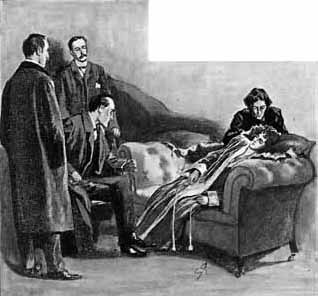
What subset of Sherlockiana really interests you?
Adaptations, for sure. I have approached Sherlock Holmes adaptations from so many different angles, and there seems to be no end to their capacity to surprise, delight, and educate me. Every time a new film or television show crops up, I am absolutely giddy with delight. I like to joke that I love even the dreadful adaptations because they’re all job security for me. But truly, my research depends on my ability to resist the idea that there is a “real” or “true” Sherlock Holmes that can be undermined or insulted by adaptations, so I can find something to enjoy in all of them. I especially love sharing adaptations with others and showing them new ways to view them.
What things do you like to research related to Sherlock Holmes?
I’m interested in the evolution of the Holmes character on screen. I like to look at what sort of “mutations” seem to have crept in over time, like the Holmes-as-caustic-antihero version that’s been popular for the last decade; what social pressures have exerted themselves on him at different times, altering, for instance, how he interacts with women in films made in different decades; and how the process of adaptation itself—everything from the practicalities of technologies to the creative control of fans—reshapes him. Think about it: we can actually trace the trajectory of a character becoming a myth. When hero tales were mostly passed down orally—King Arthur or Robin Hood for example—this process took centuries, population migrations, linguistic shifts, and cultural hybridization. It’s happened in the space of a few generations with Sherlock Holmes, and we have access to the primary history, artefacts, and, in some cases, individuals, to study. How cool is that?
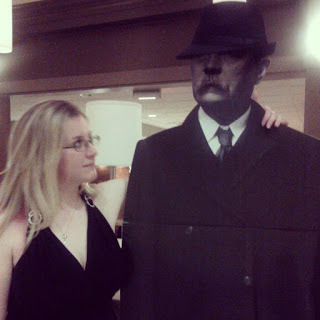 You've done lots of writing, both individually and collaboratively. Which method do you prefer?
You've done lots of writing, both individually and collaboratively. Which method do you prefer?
I write on my own, but I often lean on others during the brainstorming and revising phases. There are three Sherlockians on whom I call for that. M’Colleagues Lyndsay Faye and Tim Greer are brilliant with helping me brainstorm. Both are wildly creative, fiercely knowledgeable, and wickedly funny. I may start with the wee seed of an idea, but after an hour on a group text with them, my brain is buzzing and I’m ready to closet myself away in a café and get words on the page.
When I have a draft done, it goes to my dear friend Curtis Armstrong. Curtis and I have so much in common and think so similarly that he always seems to know what I meant rather than what I wrote and better still, is able to point it out, so in my final drafts, I write what I mean. He’s the only person who has read my full doctoral dissertation cover to cover who was not paid to do so—nobody knows my style better, and nobody is better at telling me when my tone gets to academic for a Sherlockian paper or talk. For a few years now, every Sherlockian talk I’ve given and every Sherlockian article I’ve published has benefited from Lyndsay, Tim, and Curtis.
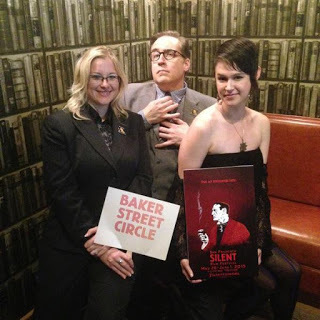
One of your areas of expertise is Sherlockian adaptations. In your opinion, what makes a good adaptation?
Ah, that really depends on a word that’s basically impossible to define: “good”. For me, a good adaptation doesn’t need to be Canonical. It doesn’t need to have some weird, ill-defined though oft-referenced “spiritual” connection to Conan Doyle. (“True to the spirit”? What does that really mean, anyway?) What it needs is a capable team of creative people who care to produce something fun to watch. That means a clever script, adept actors embodying their roles with clear intention, and careful attention to a well-realized mise-en-scène. Maybe the result is Hammer’s The Hound of the Baskervilles, maybe it’s The Private Life of Sherlock Holmes, or maybe it’s Granada’s “The Blue Carbuncle.” They’re all different, but they’re all great. We’re back to that Sherlocumenicalism!
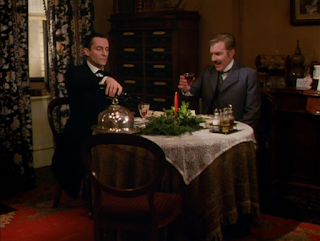
What Sherlockian things do you like to read other than the Canon?
I primarily enjoy Sherlockian non-fiction for my reading material. The articles in the Baker Street Journal are always worth the time. I learn so much not just about Holmes, but about Sherlockiana and Victoriana as well. Shout out to Steven Rothman and the time and effort he puts into editing the BSJ. I also enjoy the blogs of several Sherlockians—this one among them. These folks offer wonderful reflections on the community and its happenings. Last, but most prominently, I am active in the Sherlockian Twitterverse. I love reading posts about what others are up to—what they’re reading, what they’re writing, what events they’re attending—and I love that I get to interact with so many wonderful people I’d never have had the pleasure to know otherwise. …Are you sensing a theme emerging here?
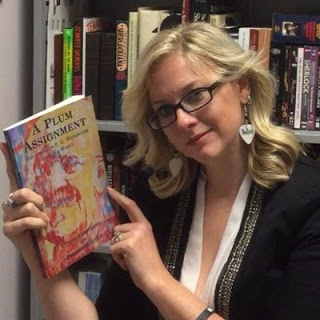
Where do you see Sherlockiana in 5 or 10 years from now?
Alive and well in whatever new media spaces are charted between now and then. The institutions will remain, enriched by the ever-emerging crop of dedicated Sherlockians who serve as permanent anchors for the community. But wherever there are spaces for like-minded people to congregate, in person or virtually, Sherlockians will be there, sharing our joy with one another and the world.

Ashley has been published in a number of Sherlockian texts including The Baker Street Journal, "Dancing to Death," "About Sixty: Why Every Sherlock Holmes Story is the Best" and way too many to list here. She was also co-editor of "Sherlock Holmes: Behind the Canonical Screen" and "A Plum Assignment: Discourses on P.G. Wodehouse and His World." A member of The Adventuresses of Sherlock Holmes and The Baker Street Babes, hardly a day passes without Sherlockiana being a part of her life.
How do you define the word “Sherlockian”?
I’m ecumenical when it comes to our beloved enthusiasm (or, as I like to call myself, Sherlocumenical), so the only Sherlockian I feel it’s my place to define is me. For me, being a Sherlockian means holding a deep affection for the Sherlock Holmes character, participating in and contributing to our community, and enjoying the fellowship of other Sherlockians. As far as I’m concerned, anyone who calls themselves “Sherlockian” is one, and is welcome to join me in that fellowship.
How did you become a Sherlockian?
Although I’d been reading the Canon and assiduously watching adaptations for some time, I feel like I became a Sherlockian when I found the community. That happened when I was 23 and found a web forum called Holmesian.net. I lived on that forum every day for upwards of a year. The atmosphere was welcoming, the denizens diverse, and the conversation utterly delightful. When I decided to pursue my PhD in England, I arranged a meet-up of members of the forum in London while I was over to have my interview with my prospective supervisor. Three months later, I attended my first BSI weekend, and I haven’t missed one since—I’ll be attending my tenth in January. Although the forum no longer exists, I have maintained treasured friendships made there. In fact, my husband and I have gone on long holidays the UK, US, and even Italy with a couple I met through the forum. I credit Holmesian.net with teaching me how to be a Sherlockian.

How did you become a professional Sherlockian?
Professional Sherlockian. Hardly seems possible, does it? It was a fortuitous confluence of events, really. Having done my BA in radio/tv/film and my MA in English with a focus on Victorian literature, I decided to write my MA thesis on adaptations of The Hound of the Baskervilles. I may have gone another route, but the point during my Master’s studies when it was time to decide on a subject for my thesis coincided with that delightful year I spent with the Holmesian.net community, and the Sherlockian fever was running high. Additionally, my university had a faculty member who was part of the Association of Adaptation Studies and was interested in supervising the project. I found that while my classmates grew weary, even embittered with their theses the longer they worked, I kept shining a light into exciting, mysterious rooms I wanted to explore, but couldn’t within the boundaries of my project.
Ultimately, I decided that if I wanted to continue my research, I should do a PhD on adaptations of Sherlock Holmes, which would give me more time and a broader purview for my research and writing. Fast forward to today, and I’ve established an international reputation as a scholar writing about Holmes on screen. I’ve published quite widely and have delivered papers at conferences from LA to Istanbul, Oxford to Sweden, and always with the aim of deepening our understanding of what I consider to be one of popular culture’s most interesting and enlightening artifacts. Academia, especially in the humanities, is a tough career path—there’s a lot of pinching pennies and slogging to make a name for yourself—but I’ve finally reached the point where I not only get paid for teaching, but also for travelling to give lectures and publishing work on Sherlock Holmes: I’m living the dream!
What is your favorite canonical story?
It’s prone to change from day to day, but I’m especially fond of Hound, having lived inside it while working on my MA thesis. I also love “Abbey Grange,” which I think explores some dark themes in an especially socially progressive way. That’s why I selected “Miss Mary Fraser” as my Adventuresses of Sherlock Holmes investiture.

What subset of Sherlockiana really interests you?
Adaptations, for sure. I have approached Sherlock Holmes adaptations from so many different angles, and there seems to be no end to their capacity to surprise, delight, and educate me. Every time a new film or television show crops up, I am absolutely giddy with delight. I like to joke that I love even the dreadful adaptations because they’re all job security for me. But truly, my research depends on my ability to resist the idea that there is a “real” or “true” Sherlock Holmes that can be undermined or insulted by adaptations, so I can find something to enjoy in all of them. I especially love sharing adaptations with others and showing them new ways to view them.
What things do you like to research related to Sherlock Holmes?
I’m interested in the evolution of the Holmes character on screen. I like to look at what sort of “mutations” seem to have crept in over time, like the Holmes-as-caustic-antihero version that’s been popular for the last decade; what social pressures have exerted themselves on him at different times, altering, for instance, how he interacts with women in films made in different decades; and how the process of adaptation itself—everything from the practicalities of technologies to the creative control of fans—reshapes him. Think about it: we can actually trace the trajectory of a character becoming a myth. When hero tales were mostly passed down orally—King Arthur or Robin Hood for example—this process took centuries, population migrations, linguistic shifts, and cultural hybridization. It’s happened in the space of a few generations with Sherlock Holmes, and we have access to the primary history, artefacts, and, in some cases, individuals, to study. How cool is that?
 You've done lots of writing, both individually and collaboratively. Which method do you prefer?
You've done lots of writing, both individually and collaboratively. Which method do you prefer?I write on my own, but I often lean on others during the brainstorming and revising phases. There are three Sherlockians on whom I call for that. M’Colleagues Lyndsay Faye and Tim Greer are brilliant with helping me brainstorm. Both are wildly creative, fiercely knowledgeable, and wickedly funny. I may start with the wee seed of an idea, but after an hour on a group text with them, my brain is buzzing and I’m ready to closet myself away in a café and get words on the page.
When I have a draft done, it goes to my dear friend Curtis Armstrong. Curtis and I have so much in common and think so similarly that he always seems to know what I meant rather than what I wrote and better still, is able to point it out, so in my final drafts, I write what I mean. He’s the only person who has read my full doctoral dissertation cover to cover who was not paid to do so—nobody knows my style better, and nobody is better at telling me when my tone gets to academic for a Sherlockian paper or talk. For a few years now, every Sherlockian talk I’ve given and every Sherlockian article I’ve published has benefited from Lyndsay, Tim, and Curtis.

One of your areas of expertise is Sherlockian adaptations. In your opinion, what makes a good adaptation?
Ah, that really depends on a word that’s basically impossible to define: “good”. For me, a good adaptation doesn’t need to be Canonical. It doesn’t need to have some weird, ill-defined though oft-referenced “spiritual” connection to Conan Doyle. (“True to the spirit”? What does that really mean, anyway?) What it needs is a capable team of creative people who care to produce something fun to watch. That means a clever script, adept actors embodying their roles with clear intention, and careful attention to a well-realized mise-en-scène. Maybe the result is Hammer’s The Hound of the Baskervilles, maybe it’s The Private Life of Sherlock Holmes, or maybe it’s Granada’s “The Blue Carbuncle.” They’re all different, but they’re all great. We’re back to that Sherlocumenicalism!

What Sherlockian things do you like to read other than the Canon?
I primarily enjoy Sherlockian non-fiction for my reading material. The articles in the Baker Street Journal are always worth the time. I learn so much not just about Holmes, but about Sherlockiana and Victoriana as well. Shout out to Steven Rothman and the time and effort he puts into editing the BSJ. I also enjoy the blogs of several Sherlockians—this one among them. These folks offer wonderful reflections on the community and its happenings. Last, but most prominently, I am active in the Sherlockian Twitterverse. I love reading posts about what others are up to—what they’re reading, what they’re writing, what events they’re attending—and I love that I get to interact with so many wonderful people I’d never have had the pleasure to know otherwise. …Are you sensing a theme emerging here?

Where do you see Sherlockiana in 5 or 10 years from now?
Alive and well in whatever new media spaces are charted between now and then. The institutions will remain, enriched by the ever-emerging crop of dedicated Sherlockians who serve as permanent anchors for the community. But wherever there are spaces for like-minded people to congregate, in person or virtually, Sherlockians will be there, sharing our joy with one another and the world.
Published on September 03, 2018 18:58
August 28, 2018
Here, There, and Everywhere
I spent an afternoon last week arguing the Sherlockian merits between Cheers, Moonlighting, The Beatles and Elvis.
This is how I spend my free time.
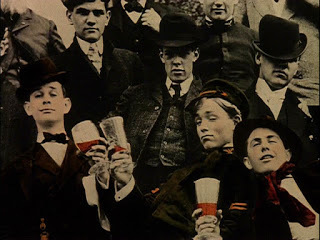
Tassy Hayden was going through old episodes of Cheers on Netflix and after some "If You Give a Mouse a Cookie" style jumps, we ended up in a debate with Brad Keefauver, Ashley Polasek and Howard Ostrom about the Sherlockian worthiness of some random topics.
Sure, Moonlighting is the only one with an actual Baker Street Irregular in its ranks, Curtis Armstrong, but when I was challenged to find even one member of the Cheers cast that could be considered a Sherlockian, Howard and I both dredged up Roger Rees, who played Kirstie Allie's rich boyfriend in a later season. He played Holmes in a 1988 BBC Radio version of HOUN and was in two episodes of Elementary in 2012 & 2014.
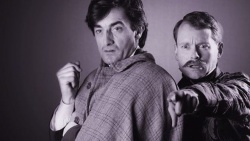
Keefauver tried saying that Elvis had better Sherlockian bonafides because of a book titled "Elvis, Sherlock and Me." And that "Hound Dog" tied him to the Baskervilles. Not the best arguments of the day.
Of course, The Beatles were from England, so there are plenty of little pieces that can be held up for an argument. But foremost was John Lennon himself, author of the Sherlockian pastiche, "The Singular Experience of Miss Anne Duffield." And there's this picture:
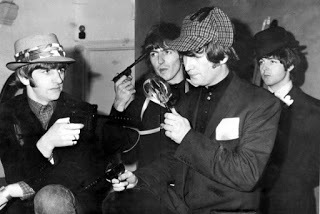
And this one:
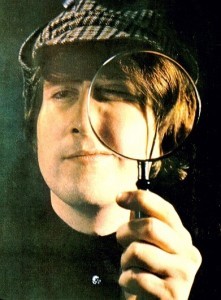
And finally a Sherlockian journal with The Beatles on the cover edited by Keefauver himself!
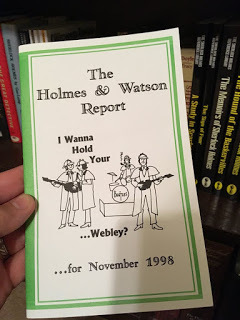
Mike drop.
After this conversation wrapped up, my daughter was watching American Girl doll videos on YouTube when I heard, "Dad! Did you know there's a Sherlock Holmes museum! The American Girl dolls went on a tour of it!
The very next day, this movie poster was released to the internet.
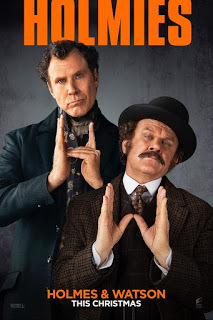
80's television, music icons, kids' YouTube videos and comedy new releases. If you look hard enough, you really can hear of Sherlock everywhere.
This is how I spend my free time.

Tassy Hayden was going through old episodes of Cheers on Netflix and after some "If You Give a Mouse a Cookie" style jumps, we ended up in a debate with Brad Keefauver, Ashley Polasek and Howard Ostrom about the Sherlockian worthiness of some random topics.
Sure, Moonlighting is the only one with an actual Baker Street Irregular in its ranks, Curtis Armstrong, but when I was challenged to find even one member of the Cheers cast that could be considered a Sherlockian, Howard and I both dredged up Roger Rees, who played Kirstie Allie's rich boyfriend in a later season. He played Holmes in a 1988 BBC Radio version of HOUN and was in two episodes of Elementary in 2012 & 2014.

Keefauver tried saying that Elvis had better Sherlockian bonafides because of a book titled "Elvis, Sherlock and Me." And that "Hound Dog" tied him to the Baskervilles. Not the best arguments of the day.
Of course, The Beatles were from England, so there are plenty of little pieces that can be held up for an argument. But foremost was John Lennon himself, author of the Sherlockian pastiche, "The Singular Experience of Miss Anne Duffield." And there's this picture:

And this one:

And finally a Sherlockian journal with The Beatles on the cover edited by Keefauver himself!

Mike drop.
After this conversation wrapped up, my daughter was watching American Girl doll videos on YouTube when I heard, "Dad! Did you know there's a Sherlock Holmes museum! The American Girl dolls went on a tour of it!
The very next day, this movie poster was released to the internet.

80's television, music icons, kids' YouTube videos and comedy new releases. If you look hard enough, you really can hear of Sherlock everywhere.
Published on August 28, 2018 18:53
August 20, 2018
Some Talent in the Detective Line
I met a new detective recently.
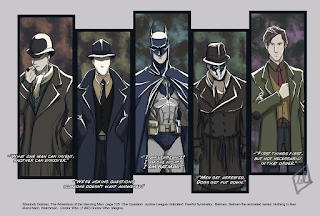
Whoa, whoa, whoa, Sherlock Holmes is still at the top, but this new guy made me smirk as I read his stories and really enjoyed the pacing of the writing. Watson's narratives are so trustworthy and reliable that you can always count on a well-told story that will display Holmes' strengths while Watson's modesty forces him to downplay his own. But this was a nice change of pace.
And sure, Watson has left us all of the trifles to pick apart. The chronology. The unpublished cases. The layout of 221B. Etc. But for those of us who have read and reread the 60 stories over and over again, that flush of fresh adventure is gone. And that's okay for most of us. Sherlockians have invented our own subculture to keep us coming back to these masterpieces of storytelling.
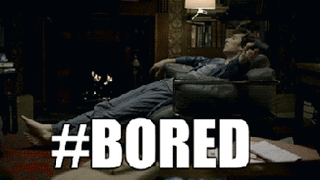
But I'm babbling. I started out talking about the new guy.
School started back up this week, and if you know any teachers, you'll know we aren't able of much mental stimulation outside of work during the first week of school. So I picked up what I expected to be a light read off of my TBR shelf, "Too Many Cooks" by Rex Stout. I've heard about Wolfe plenty in relation to Holmes throughout my years as a Sherlockian, but this was the first Nero Wolfe story I've ever read. And I loved every page of it (except for the outdated racial attitudes of the 30's, but that's a whole other discussion).
But Nero Wolfe isn't the interesting character in this story to me. Archie Goodwin is my man! Granted, I've only read one story so maybe I'm completely off here. But his wry wit and boots on the ground activities were a delight to read. In Watson's narratives, Holmes gets to do all of the deducing and the legwork, leaving Watson to be astonished at the reveal. In Goodwin, we get a sidekick who isn't afraid to call his partner on his crap while being active throughout the story. I've already ordered my next Nero Wolfe book to revisit these two again.
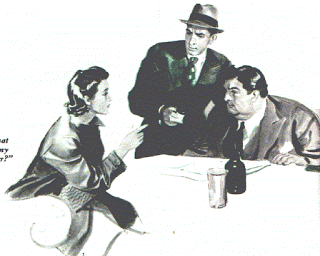
So I'll be revisiting Archie Goodwin and Nero Wolfe again, but at the end of the day, they are a nice diversion from my true literary interest: Sherlock Holmes and Dr. Watson.
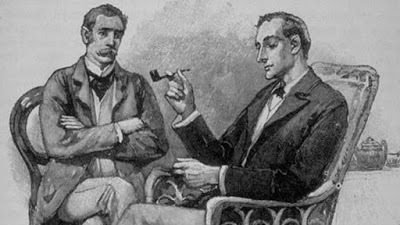

Whoa, whoa, whoa, Sherlock Holmes is still at the top, but this new guy made me smirk as I read his stories and really enjoyed the pacing of the writing. Watson's narratives are so trustworthy and reliable that you can always count on a well-told story that will display Holmes' strengths while Watson's modesty forces him to downplay his own. But this was a nice change of pace.
And sure, Watson has left us all of the trifles to pick apart. The chronology. The unpublished cases. The layout of 221B. Etc. But for those of us who have read and reread the 60 stories over and over again, that flush of fresh adventure is gone. And that's okay for most of us. Sherlockians have invented our own subculture to keep us coming back to these masterpieces of storytelling.

But I'm babbling. I started out talking about the new guy.
School started back up this week, and if you know any teachers, you'll know we aren't able of much mental stimulation outside of work during the first week of school. So I picked up what I expected to be a light read off of my TBR shelf, "Too Many Cooks" by Rex Stout. I've heard about Wolfe plenty in relation to Holmes throughout my years as a Sherlockian, but this was the first Nero Wolfe story I've ever read. And I loved every page of it (except for the outdated racial attitudes of the 30's, but that's a whole other discussion).
But Nero Wolfe isn't the interesting character in this story to me. Archie Goodwin is my man! Granted, I've only read one story so maybe I'm completely off here. But his wry wit and boots on the ground activities were a delight to read. In Watson's narratives, Holmes gets to do all of the deducing and the legwork, leaving Watson to be astonished at the reveal. In Goodwin, we get a sidekick who isn't afraid to call his partner on his crap while being active throughout the story. I've already ordered my next Nero Wolfe book to revisit these two again.

So I'll be revisiting Archie Goodwin and Nero Wolfe again, but at the end of the day, they are a nice diversion from my true literary interest: Sherlock Holmes and Dr. Watson.

Published on August 20, 2018 18:14
August 14, 2018
This We Accomplished
We did it!
The Parallel Case of St. Louis successfully pulled off Holmes in the Heartland last weekend!
It's been over 48 hours since our last event ended, and I'm still amazed at how awesome the weekend was. We had people from as far away as California, two elementary school kids, a high school student, lots of local Sherlockians, and an impressive array of notable visitors to make for a great weekend.

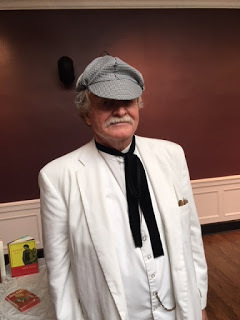
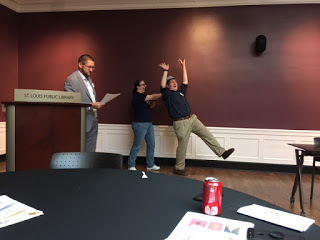
If you missed the live tweets of the event, The Parallel Case of St. Louis account, Tim Johnson, and Brad Keefauver all kept people informed with their play by plays.
Sherlock Peoria and The Harpooners of the Sea Unicorn's blog also had some great posts about the weekend's events.
And The Parallel Case of St. Louis' blog did a recap each night for Friday, Saturday, and Sunday.
I think because I'm so active on social media and have been promoting it quite a bit, my name has been used more that it should have when people complimented the Holmes in the Heartland event. I was a small part of a unbelievable planning committee that included Stacey Bregenzer, Nellie Brown, Joe Eckrich, BSI, Randy Getz, Tassy Hayden, Mary Schroeder, ASH, and Paul Schroeder. These folks put in an insane amount of time, money and energy into this event and deserve every bit of praise that can be heaped on them.

We've received a lot of positive feedback on Holmes in the Heartland and I am SO happy that everyone that joined us enjoyed themselves. In my mind, Holmes in the Heartland had a lot of purposes, highlight the city of St. Louis, introduce the St. Louis Sherlockian Research Collection to a larger audience outside of our region, present some heartfelt, thought provoking, and entertaining presentations etc. But one of the most important of them were to create an event where Sherlockians can get together, make new friends, have an excuse to get together with old ones, and have a good time all around. Judging from the feedback, I think we nailed that last one!
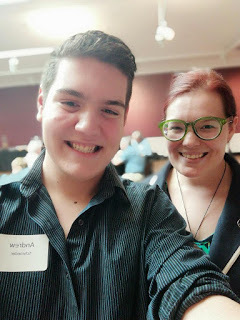
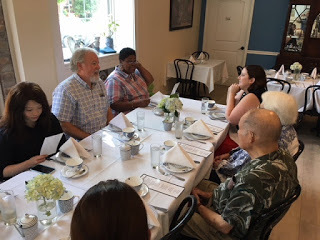
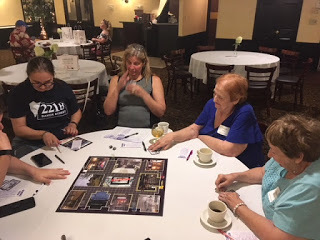
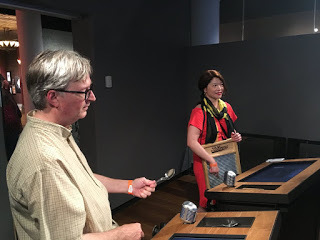
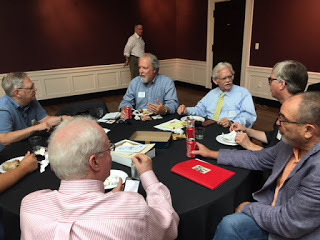


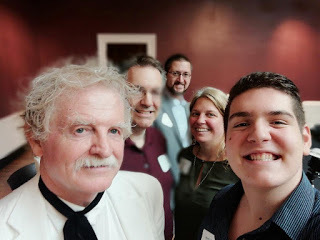
I've also had people ask about our next one. But let's take a moment to enjoy what we've done. I promise news about our future plans will come out in due time. " But you must give me time—you must give me time!"
The Parallel Case of St. Louis successfully pulled off Holmes in the Heartland last weekend!
It's been over 48 hours since our last event ended, and I'm still amazed at how awesome the weekend was. We had people from as far away as California, two elementary school kids, a high school student, lots of local Sherlockians, and an impressive array of notable visitors to make for a great weekend.



If you missed the live tweets of the event, The Parallel Case of St. Louis account, Tim Johnson, and Brad Keefauver all kept people informed with their play by plays.
Sherlock Peoria and The Harpooners of the Sea Unicorn's blog also had some great posts about the weekend's events.
And The Parallel Case of St. Louis' blog did a recap each night for Friday, Saturday, and Sunday.
I think because I'm so active on social media and have been promoting it quite a bit, my name has been used more that it should have when people complimented the Holmes in the Heartland event. I was a small part of a unbelievable planning committee that included Stacey Bregenzer, Nellie Brown, Joe Eckrich, BSI, Randy Getz, Tassy Hayden, Mary Schroeder, ASH, and Paul Schroeder. These folks put in an insane amount of time, money and energy into this event and deserve every bit of praise that can be heaped on them.

We've received a lot of positive feedback on Holmes in the Heartland and I am SO happy that everyone that joined us enjoyed themselves. In my mind, Holmes in the Heartland had a lot of purposes, highlight the city of St. Louis, introduce the St. Louis Sherlockian Research Collection to a larger audience outside of our region, present some heartfelt, thought provoking, and entertaining presentations etc. But one of the most important of them were to create an event where Sherlockians can get together, make new friends, have an excuse to get together with old ones, and have a good time all around. Judging from the feedback, I think we nailed that last one!








I've also had people ask about our next one. But let's take a moment to enjoy what we've done. I promise news about our future plans will come out in due time. " But you must give me time—you must give me time!"
Published on August 14, 2018 19:33
July 30, 2018
This is a Very Unexpected Turn of Affairs
My original plan for this week's blog was to write about some tiffs that popped up in the past week or so. My post about the Gnostic books of Sherlockiana caused a kerfuffle on Facebook, and the fact that The Baker Street Irregulars are a trademarked organization caused some debate.
But instead I've decided to talk about sex and church.

The Old Testament reading at my church service yesterday was from Second Samuel, Chapter 11. I immediately perked up when I saw it listed in the bulletin. "I think I know this one..." I thought. Sure enough, it's what I thought it was. If it doesn't jump to mind, here's the text:
11 In the spring, at the time when kings go off to war, David sent Joab out with the king’s men and the whole Israelite army. They destroyed the Ammonites and besieged Rabbah. But David remained in Jerusalem.
2 One evening David got up from his bed and walked around on the roof of the palace. From the roof he saw a woman bathing. The woman was very beautiful, 3 and David sent someone to find out about her. The man said, “She is Bathsheba, the daughter of Eliam and the wife of Uriah the Hittite.” 4 Then David sent messengers to get her. She came to him, and he slept with her. (Now she was purifying herself from her monthly uncleanness.) Then she went back home. 5 The woman conceived and sent word to David, saying, “I am pregnant.”
6 So David sent this word to Joab: “Send me Uriah the Hittite.” And Joab sent him to David. 7 When Uriah came to him, David asked him how Joab was, how the soldiers were and how the war was going. 8 Then David said to Uriah, “Go down to your house and wash your feet.” So Uriah left the palace, and a gift from the king was sent after him. 9 But Uriah slept at the entrance to the palace with all his master’s servants and did not go down to his house.
10 David was told, “Uriah did not go home.” So he asked Uriah, “Haven’t you just come from a military campaign? Why didn’t you go home?”
11 Uriah said to David, “The ark and Israel and Judah are staying in tents,[a] and my commander Joab and my lord’s men are camped in the open country. How could I go to my house to eat and drink and make love to my wife? As surely as you live, I will not do such a thing!”
12 Then David said to him, “Stay here one more day, and tomorrow I will send you back.” So Uriah remained in Jerusalem that day and the next. 13 At David’s invitation, he ate and drank with him, and David made him drunk. But in the evening Uriah went out to sleep on his mat among his master’s servants; he did not go home.
14 In the morning David wrote a letter to Joab and sent it with Uriah. 15 In it he wrote, “Put Uriah out in front where the fighting is fiercest. Then withdraw from him so he will be struck down and die.”
16 So while Joab had the city under siege, he put Uriah at a place where he knew the strongest defenders were. 17 When the men of the city came out and fought against Joab, some of the men in David’s army fell; moreover, Uriah the Hittite died.
18 Joab sent David a full account of the battle. 19 He instructed the messenger: “When you have finished giving the king this account of the battle, 20 the king’s anger may flare up, and he may ask you, ‘Why did you get so close to the city to fight? Didn’t you know they would shoot arrows from the wall? 21 Who killed Abimelek son of Jerub-Besheth[b]? Didn’t a woman drop an upper millstone on him from the wall, so that he died in Thebez? Why did you get so close to the wall?’ If he asks you this, then say to him, ‘Moreover, your servant Uriah the Hittite is dead.’”
22 The messenger set out, and when he arrived he told David everything Joab had sent him to say. 23 The messenger said to David, “The men overpowered us and came out against us in the open, but we drove them back to the entrance of the city gate. 24 Then the archers shot arrows at your servants from the wall, and some of the king’s men died. Moreover, your servant Uriah the Hittite is dead.”
25 David told the messenger, “Say this to Joab: ‘Don’t let this upset you; the sword devours one as well as another. Press the attack against the city and destroy it.’ Say this to encourage Joab.”
26 When Uriah’s wife heard that her husband was dead, she mourned for him. 27 After the time of mourning was over, David had her brought to his house, and she became his wife and bore him a son. But the thing David had done displeased the Lord.
...and there's the story referenced in The Adventure of the Crooked Man. I'm very interested in the intersection of our Canon and biblical scholarship, so this was especially interesting to me. Maybe it wasn't appropriate for me to be happy to see a text about adultery and murder in church, but we take our Sherlockian in the wild sightings where we can get them sometimes.
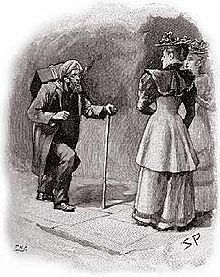
But instead I've decided to talk about sex and church.

The Old Testament reading at my church service yesterday was from Second Samuel, Chapter 11. I immediately perked up when I saw it listed in the bulletin. "I think I know this one..." I thought. Sure enough, it's what I thought it was. If it doesn't jump to mind, here's the text:
11 In the spring, at the time when kings go off to war, David sent Joab out with the king’s men and the whole Israelite army. They destroyed the Ammonites and besieged Rabbah. But David remained in Jerusalem.
2 One evening David got up from his bed and walked around on the roof of the palace. From the roof he saw a woman bathing. The woman was very beautiful, 3 and David sent someone to find out about her. The man said, “She is Bathsheba, the daughter of Eliam and the wife of Uriah the Hittite.” 4 Then David sent messengers to get her. She came to him, and he slept with her. (Now she was purifying herself from her monthly uncleanness.) Then she went back home. 5 The woman conceived and sent word to David, saying, “I am pregnant.”
6 So David sent this word to Joab: “Send me Uriah the Hittite.” And Joab sent him to David. 7 When Uriah came to him, David asked him how Joab was, how the soldiers were and how the war was going. 8 Then David said to Uriah, “Go down to your house and wash your feet.” So Uriah left the palace, and a gift from the king was sent after him. 9 But Uriah slept at the entrance to the palace with all his master’s servants and did not go down to his house.
10 David was told, “Uriah did not go home.” So he asked Uriah, “Haven’t you just come from a military campaign? Why didn’t you go home?”
11 Uriah said to David, “The ark and Israel and Judah are staying in tents,[a] and my commander Joab and my lord’s men are camped in the open country. How could I go to my house to eat and drink and make love to my wife? As surely as you live, I will not do such a thing!”
12 Then David said to him, “Stay here one more day, and tomorrow I will send you back.” So Uriah remained in Jerusalem that day and the next. 13 At David’s invitation, he ate and drank with him, and David made him drunk. But in the evening Uriah went out to sleep on his mat among his master’s servants; he did not go home.
14 In the morning David wrote a letter to Joab and sent it with Uriah. 15 In it he wrote, “Put Uriah out in front where the fighting is fiercest. Then withdraw from him so he will be struck down and die.”
16 So while Joab had the city under siege, he put Uriah at a place where he knew the strongest defenders were. 17 When the men of the city came out and fought against Joab, some of the men in David’s army fell; moreover, Uriah the Hittite died.
18 Joab sent David a full account of the battle. 19 He instructed the messenger: “When you have finished giving the king this account of the battle, 20 the king’s anger may flare up, and he may ask you, ‘Why did you get so close to the city to fight? Didn’t you know they would shoot arrows from the wall? 21 Who killed Abimelek son of Jerub-Besheth[b]? Didn’t a woman drop an upper millstone on him from the wall, so that he died in Thebez? Why did you get so close to the wall?’ If he asks you this, then say to him, ‘Moreover, your servant Uriah the Hittite is dead.’”
22 The messenger set out, and when he arrived he told David everything Joab had sent him to say. 23 The messenger said to David, “The men overpowered us and came out against us in the open, but we drove them back to the entrance of the city gate. 24 Then the archers shot arrows at your servants from the wall, and some of the king’s men died. Moreover, your servant Uriah the Hittite is dead.”
25 David told the messenger, “Say this to Joab: ‘Don’t let this upset you; the sword devours one as well as another. Press the attack against the city and destroy it.’ Say this to encourage Joab.”
26 When Uriah’s wife heard that her husband was dead, she mourned for him. 27 After the time of mourning was over, David had her brought to his house, and she became his wife and bore him a son. But the thing David had done displeased the Lord.
...and there's the story referenced in The Adventure of the Crooked Man. I'm very interested in the intersection of our Canon and biblical scholarship, so this was especially interesting to me. Maybe it wasn't appropriate for me to be happy to see a text about adultery and murder in church, but we take our Sherlockian in the wild sightings where we can get them sometimes.

Published on July 30, 2018 19:17
July 23, 2018
A Pupil for the Scientific Methods
This month's story for The Harpooners of the Sea Unicorn was The Adventure of Black Peter, which offers many opportunities for scholarship. Watson’s introduction is a gold mine for minutiae, including but not limited to Holmes’ employment by the Pope himself and passing reference to Holmes’ five refuges scattered throughout London where he was able to change his personality. We also see Holmes contradict himself on theorizing before one has data and the inclusion of coincidences into his investigations.
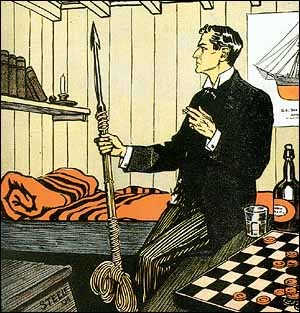
While all of those are areas rife for future posts, I found the Scotland Yard investigator the most interesting trifle this week. In BLAC we are first introduced to the young police inspector Stanley Hopkins. Watson describes him as “an exceedingly alert man, thirty years of age, dressed in a quiet tweed suit, but retaining the erect bearing of one who was accustomed to official uniform.”
Watson recognizes Hopkins when he enters into Baker Street in BLAC, because Stanley Hopkins is one of the recurring Scotland Yard officers not named Lestrade that pops up here and there. (Side note, while Lestrade is the most often used officer; these less frequently used ones actually get their first names published in the stories, while Lestrade will forever only be known as “G. Lestrade.”) Young Stanley Hopkins, Watson tells us in BLAC, is someone whose future Holmes has high hopes for. Hopkins admires the consulting detective and openly treats Holmes as someone from whom he can learn a great deal. We learn in a later tale that Hopkins has employed Holmes at least seven times in his career, but Watson has only chronicled three of these. Hopkins’ tenure in the Canon is probably the most positive relationship Sherlock Holmes has with a Scotland Yard officer from beginning to end.
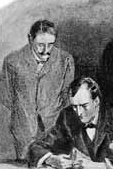
Interestingly, Stanley Hopkins only appears on the pages of The Return of Sherlock Holmes. BLAC is his first appearance, but since this story takes place in 1895, Holmes and Watson have worked with the young officer at least once before, in The Adventure of the Golden Pince-Nez in 1894. Hopkins has shown some growth as an investigator by this time. He tells Holmes “I know your methods, sir, and I applied them. Before I permitted anything to be moved I examined most carefully the ground outside, and also the floor of the room. There were no footmarks.”
Of course, Sherlock Holmes feels that his young student has missed some details, giving him an ironic comment that makes the man wince, but he keeps on. Hopkins admits he should have involved Holmes earlier, but who hasn’t been a fresh faced youngster trying to make a name for themselves in a new career field? We can hardly blame Stanley Hopkins for wanting to succeed at his job on his own merit. We should be giving him credit for knowing when he is in over his head and looking for outside help. As often as we see Holmes chide officers for taking so long to include him, I’m sure he would’ve been even more perturbed had he been summoned to every single crime scene in London for their first viewings. Quite a tiring endeavor!
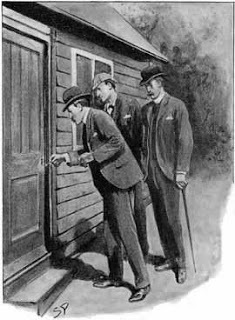
Hopkins produces more evidence for Holmes, who in turn, leads the investigation in the correct manner. Would Stanley Hopkins have solved the murder of Captain Peter Caray on his own? I doubt it. He was unfamiliar with the initials on some of the Stock Exchange securities, and even if he had decided to wait for the suspect to return to the scene of the crime, his choice to wait INSIDE the cabin would have likely scared Neligan off as Holmes had predicted. So, even though young officer Hopkins shows promise, he has a way to go.
We get a passing mention to Hopkins in The Adventure of the Missing Three Quarter later on, as he has referred that story’s client, Cyril Overton, to Holmes but his last canonical and chronological appearance is in The Adventure of the Abbey Grange, which takes place in 1897. Here he calls Holmes in immediately, and he has been promoted to Inspector, but Hopkins is still far from being on the same level as the great detective. Perhaps Stanley Hopkins will never reach the heights of deductive reasoning as Sherlock Holmes, but I’m glad to see that Scotland Yard has officers who are willing to keep trying.
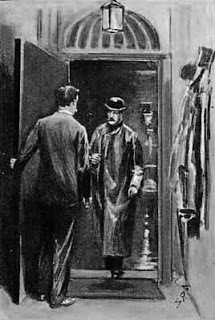
Published on July 23, 2018 19:37
July 15, 2018
We Are of Those Who Believe in Those Sacred Writings
I would assume that most of you are like me and have quite a TBR (To Be Read) list. I actually have two: my regular one and a Sherlockian one. The Sherlockian one is then broken down into subsets: The Shaw 100, Scholarship, Pastiche, Graphic Novels... I know, I'm a nerd.
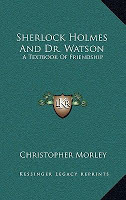
One of the books that has been on my list for quite a while has been Sherlock Holmes and Dr. Watson: A Textbook of Friendship by Christopher Morley. Normally, this pleasant volume would have been a nice Sherlockian treat along with my other summer reading. But it so happened that I read this book right after I had just finished reading about the Q Source document. I will leave it to Wikipedia to define:
The Q source (also Q document, Q Gospel, or Q from German: Quelle, meaning "source") is a hypothetical written collection of primarily Jesus' sayings ( logia ). Q is part of the common material found in the Gospels of Matthew and Luke but not in the Gospel of Mark. According to this hypothesis, this material was drawn from the early Church's Oral Tradition.
That led me to re-reading some information on the Gnostic gospels, or biblical texts that are not part of the New Testament. There is quite a bit of discussion on how true these texts are to the Christian beliefs, and their veracity is debated by biblical scholars.
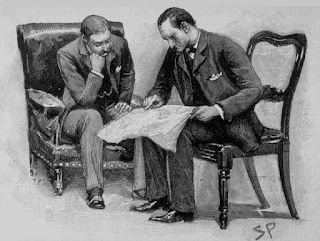
Now, how did this affect my Sherlockian pleasure reading? Well, as I was reading Morley's book, I was still thinking about some of the points in the biblical scholarship, and then Morley mentioned Holmes' cases beyond the recorded Canon written by Dr. Watson.
And then I realized: Sherlockiana has its own Q Source and Gnostic texts.
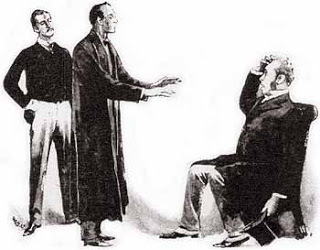
The biblical Q is a supposed document that has been lost to time, but its influence reverberates throughout history. And the Sherlockian Q? Well, let's look at the very first story. We first meet Sherlock Holmes on page 3 of A Study in Scarlet. Page 2 introduces us to Dr. Watson. And what's on page 1?
Being a reprint from the reminiscences ofJohn H. Watson, M.D.,late of the Army Medical Department
That's right, STUD, the starting point of the whole Sherlockian Canon is only a small part of a larger text. I propose that The Reminiscences of John H. Watson, M.D. is our Sherlockian Q text. Who knows what tales are in that long lost tome? I bet we'd find out a little more about his "experience of women which extends over many nations and three separate continents" along with some other points of interest.
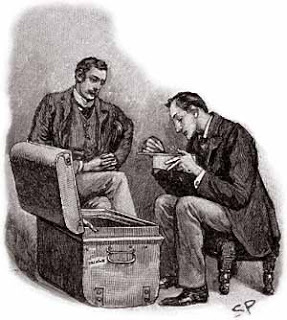
And what of our own Gnostic texts, those stories that scholars argue over their inclusion into the Canon? Some may say the Sherlockian Gnosticism should be Watson's mentioned but never chronicled cases or even clever pastiches by other authors.
But, I offer that our Sherlockian totem knowledge should be treated as such.
Watson's middle name as HamishHolmes' birthdaySherlock's older brother SherrinfordEtc.
These are all stories and theories that are out there but outside of our written Canon. Just like the Gospel of Mary of the Acts of John, these are informational points about our main man, but does everyone subscribe to them? No.
As Christopher Morley famously said about our little hobby: "Never has so much been written by so many for so few." Maybe we have a new branch of Sherlockian study right here. Sherlockian Gnosticism. If we can steal the term "Canon" why not other religious terms?
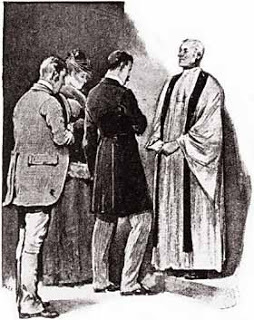

One of the books that has been on my list for quite a while has been Sherlock Holmes and Dr. Watson: A Textbook of Friendship by Christopher Morley. Normally, this pleasant volume would have been a nice Sherlockian treat along with my other summer reading. But it so happened that I read this book right after I had just finished reading about the Q Source document. I will leave it to Wikipedia to define:
The Q source (also Q document, Q Gospel, or Q from German: Quelle, meaning "source") is a hypothetical written collection of primarily Jesus' sayings ( logia ). Q is part of the common material found in the Gospels of Matthew and Luke but not in the Gospel of Mark. According to this hypothesis, this material was drawn from the early Church's Oral Tradition.
That led me to re-reading some information on the Gnostic gospels, or biblical texts that are not part of the New Testament. There is quite a bit of discussion on how true these texts are to the Christian beliefs, and their veracity is debated by biblical scholars.

Now, how did this affect my Sherlockian pleasure reading? Well, as I was reading Morley's book, I was still thinking about some of the points in the biblical scholarship, and then Morley mentioned Holmes' cases beyond the recorded Canon written by Dr. Watson.
And then I realized: Sherlockiana has its own Q Source and Gnostic texts.

The biblical Q is a supposed document that has been lost to time, but its influence reverberates throughout history. And the Sherlockian Q? Well, let's look at the very first story. We first meet Sherlock Holmes on page 3 of A Study in Scarlet. Page 2 introduces us to Dr. Watson. And what's on page 1?
Being a reprint from the reminiscences ofJohn H. Watson, M.D.,late of the Army Medical Department
That's right, STUD, the starting point of the whole Sherlockian Canon is only a small part of a larger text. I propose that The Reminiscences of John H. Watson, M.D. is our Sherlockian Q text. Who knows what tales are in that long lost tome? I bet we'd find out a little more about his "experience of women which extends over many nations and three separate continents" along with some other points of interest.

And what of our own Gnostic texts, those stories that scholars argue over their inclusion into the Canon? Some may say the Sherlockian Gnosticism should be Watson's mentioned but never chronicled cases or even clever pastiches by other authors.
But, I offer that our Sherlockian totem knowledge should be treated as such.
Watson's middle name as HamishHolmes' birthdaySherlock's older brother SherrinfordEtc.
These are all stories and theories that are out there but outside of our written Canon. Just like the Gospel of Mary of the Acts of John, these are informational points about our main man, but does everyone subscribe to them? No.
As Christopher Morley famously said about our little hobby: "Never has so much been written by so many for so few." Maybe we have a new branch of Sherlockian study right here. Sherlockian Gnosticism. If we can steal the term "Canon" why not other religious terms?

Published on July 15, 2018 19:14
July 8, 2018
It Had Become In Some Way Helpful That I Should Register
I have been spending quite a bit of time on my computer lately working on things for Holmes in the Heartland, happening on August 10-12. Registration closes in two weeks, and LOTS of emails are being sent, the program is being laid out, registrations are being logged, etc.
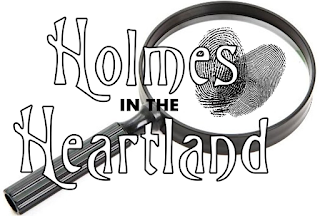
And every time I think about Holmes in the Heartland, I either get really excited or have a mild panic attack.
When I see posts like this one about a groundbreaking talk that's being concocting, I'm beyond excited that we will have a great line up of speakers and demonstrations.
Looking at the list of people who have signed up to attend makes me realize that we're going to have a really great group of people at the dinners, social events, and milling about in between Saturday's speakers.

As I was telling my mom about the event this afternoon, it really dawned on me what a nice mix of Sherlockiana and St. Louis we've created. If I weren't part of The Parallel Case of St. Louis and heard about this conference, I would be VERY interested in checking some of these things out.
And, I know I've said this before but it bears repeating, I really love working with everyone who's been associated with the planning process. Throwing something of this scale together in just a few months' time has been a true testament to how great everyone on the planning committee is, and how much they want to put on a really great Sherlockian event.
In my mind, all of these things are great. But I've never been in charge of a large event like this, and my anxiety kicks into overdrive every now and again with this. Especially now that the end of registration is THIS MONTH. And we are just over a month away from the actual event. What have I forgotten to do? What needs to be followed up on? What have I not even thought about? Will the older and younger Sherlockians mesh well? Did I make a wrong decision along the way in the planning? What if everyone at the weekend catches some strand of avian flu?
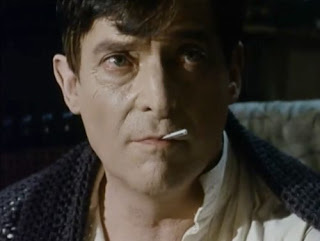
Okay, I admit I let my imagination run away there.
But, man oh man, does Holmes in the Heartland get me excited. Usually in the good sense, but sometimes in a more neurotic way.
Do you want to help my nervousness? Sign up to join us! C'mon, you know you want to...
BBQ!

Blues music!
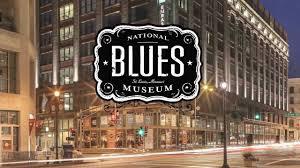
Sherlockian speakers!
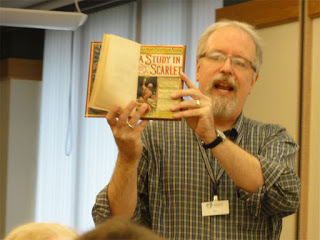
A brand new research collection!

Fight sequences!

A surprise speaker!

Delicious Italian dinner!

Medical history!

Afternoon tea!

And best of all, other Sherlockians to spend the weekend with!
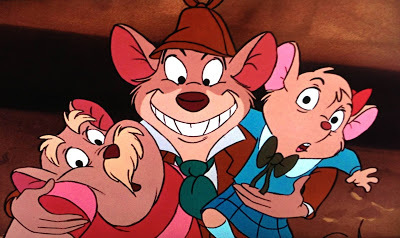
So, make like Holmes in The Engineer's Thumb: Forego your Bohemian habits so far as to come and visit us! https://parallelcasestl.wixsite.com/home/contact

And every time I think about Holmes in the Heartland, I either get really excited or have a mild panic attack.
When I see posts like this one about a groundbreaking talk that's being concocting, I'm beyond excited that we will have a great line up of speakers and demonstrations.
Looking at the list of people who have signed up to attend makes me realize that we're going to have a really great group of people at the dinners, social events, and milling about in between Saturday's speakers.

As I was telling my mom about the event this afternoon, it really dawned on me what a nice mix of Sherlockiana and St. Louis we've created. If I weren't part of The Parallel Case of St. Louis and heard about this conference, I would be VERY interested in checking some of these things out.
And, I know I've said this before but it bears repeating, I really love working with everyone who's been associated with the planning process. Throwing something of this scale together in just a few months' time has been a true testament to how great everyone on the planning committee is, and how much they want to put on a really great Sherlockian event.
In my mind, all of these things are great. But I've never been in charge of a large event like this, and my anxiety kicks into overdrive every now and again with this. Especially now that the end of registration is THIS MONTH. And we are just over a month away from the actual event. What have I forgotten to do? What needs to be followed up on? What have I not even thought about? Will the older and younger Sherlockians mesh well? Did I make a wrong decision along the way in the planning? What if everyone at the weekend catches some strand of avian flu?

Okay, I admit I let my imagination run away there.
But, man oh man, does Holmes in the Heartland get me excited. Usually in the good sense, but sometimes in a more neurotic way.
Do you want to help my nervousness? Sign up to join us! C'mon, you know you want to...
BBQ!

Blues music!

Sherlockian speakers!

A brand new research collection!

Fight sequences!

A surprise speaker!

Delicious Italian dinner!

Medical history!

Afternoon tea!

And best of all, other Sherlockians to spend the weekend with!

So, make like Holmes in The Engineer's Thumb: Forego your Bohemian habits so far as to come and visit us! https://parallelcasestl.wixsite.com/home/contact
Published on July 08, 2018 21:55
July 1, 2018
Interesting Interviews: Ray Betzner
July's Interesting Interview is with Ray Betzner, BSI. I got to meet Ray this year at the Holmes, Doyle and Friends conference and wrote about what a great guy he is in that post, so I won't overflow too much with compliments here. I will say that he is a very knowledgeable, witty and friendly guy and definitely someone we should all be lucky enough to spend time with.
(Side note, as I am typing this intro, Ray has been commenting on my vacation photos on Facebook. So, he's not just a friendly guy when it comes to Sherlockiana!)
Ray runs the great blog, Studies in Starrett, which, for any Sherlockian interested in the founding fathers of our hobby, is a must read. In perfect timing, I invited Ray to do this interview on the same week that his blog is going on a summer hiatus, so make sure to go back and read some of his earlier work while waiting for his return in the fall!
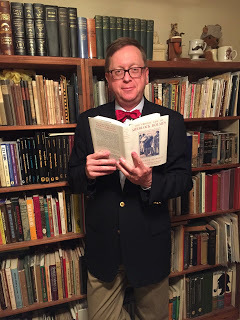
How do you define the word “Sherlockian”?
I once knew how to define a Sherlockian, but the field has become so diverse in recent years that it’s not easy. It’s certainly an expanded universe today, and that is for the best.
How did you become a Sherlockian?
I first read parts of the Canon as a child. When I was 16 and could drive, one of the first places I went was the local library, which had two Holmes books: THE COMPLETE SHERLOCK HOLMES with the Christopher Morley introduction, and THE PRIVATE LIFE OF SHERLOCK HOLMES by Vincent Starrett. Reading the entire Canon was a revelation: so many mysteries to be solved.
Starrett’s book talked about Holmes as if he was a living human being. He also recorded the activities of a group of Holmes addicts known as the Baker Street Irregulars. For a kid from working class roots, the group seemed like fantastic characters who lived in a mythical world mere mortals could not enter.
I kept up my interest through college and found great mentors: Andrew Fusco, John Bennett Shaw, Ely Liebow, Chuck and Peggy Henry among many others. Meeting others who shared my passion was (and remains) a great pleasure.
Fifteen years after reading Starrett’s book for the first time, I was invested as a member of the Baker Street Irregulars. Rather than be the end of a journey, it was really just the start of a new chapter and I’ve been engaged with what I think of as “the Sherlockian movement” ever since.
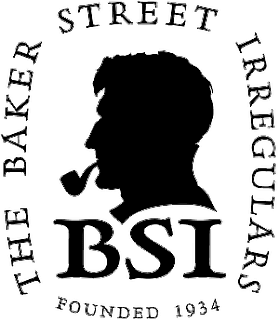
What is your favorite canonical story?
That’s a tough one, and the answer has changed over the decades. “The Speckled Band” and “The Red-Headed League” were favorites for years.
But as time has gone on, I’ve found my tastes changing. For example, I was never a big fan of “The Adventure of the Dancing Men,” but after spending months editing DANCING TO DEATH, one of the BSI manuscript books, I have become a convert. The story is far more complex than it appears at first and I’ve become intrigued with trying to explain why Holmes failed to prevent his client’s death.
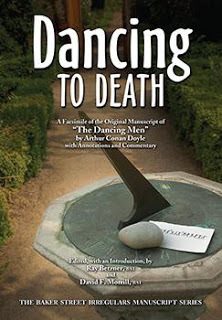
What subset of Sherlockiana really interests you?
I owe Vincent Starrett a huge debt for introducing me to the BSI through THE PRIVATE LIFE OF SHERLOCK HOLMES. So I took an interest in his other Sherlockian writings, and then his other work, which is considerable and highly varied. Four years ago I started a blog, STUDIES IN STARRETT (www.vincentstarrett.com), and a companion Facebook page. Introducing new folks to the broad range of his work has been a delight. I’ve gotten tremendous positive feedback over the years.
When you think about it, we’ve paid back Morley and Starrett in the best possible way. Holmes was just a small bit of both men’s literary output, but for the most part, it is the Sherlockians who have kept their reputations alive.
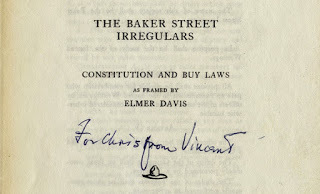
What things do you like to research related to Sherlock Holmes?
I largely do research to support my writing and I’ve written everything but pastiches over the decades. I wrote mock radio play parodies about Holmes for several years as entertainment for The Cremona Fiddlers of Williamsburg, a scion I helped start back in the 1980s. Only one of the parodies holds up today, and I would love to see it revived.
I’ve done a handful of traditional trifling monographs, and one well-received talk about how Dr. Watson coped with the deaths of Holmes and Mary. I still think there is much more to be written about Mary and her impact on Holmes and Watson. She has been ignored too long.
It’s probably no surprise that Starrettian studies are my favorite. Editing a new edition of THE PRIVATE LIFE OF SHERLOCK HOLMES for Wessex Press was a true labor of love. And the blog is fun because I get to show off my book collection while bringing Starrett’s work to life.
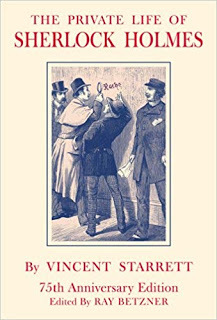
What are some of the most interesting things you've come across in your time doing Studies in Starrett?
The most unexpected event came when I found a copy of Starrett’s first book of poetry in Vancouver, with an inscription from Starrett to his mother. I was thrilled to have the book, but the story of how it came to be in Canada was bittersweet. Turns out Starrett’s mother committed suicide by jumping from a ferry boat while in Vancouver with a Christian group preaching to the native peoples. She must have taken the book from Chicago to Vancouver on her last trip. The whole story is here: http://www.vincentstarrett.com/blog/2014/7/24/dear-mother-
I have also been lucky enough to purchase a manuscript that includes a copy of Starrett’s immortal poem “221B,” straight out of Starrett’s typewriter Holding that page still makes my hands shake. http://www.vincentstarrett.com/blog/2018/2/24/autolycus-in-limbo-the-manuscript
Along the way, I’ve also become friends with Starrett’s distant relatives and some have been very kind to share their photos and other family treasures. So I’ve been able to trace his work as a war correspondent in Mexico, his adventures in London as a teen and the trip he and his second wife, Rachel (Ray) took around the world. Those photos are at the Facebook page and a few are here:http://www.vincentstarrett.com/blog/2018/5/29/vincent-starrett-in-the-forbidden-city-part-1
And here:http://www.vincentstarrett.com/blog/2018/5/30/peking-pays-off-vs-in-the-forbidden-city-part-2
The amazing part to me is that there is so much about Starrett, his life, his family and his work that I have yet to dig into.
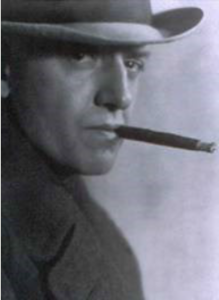
How different do you think the world of Sherlockiana would be if Vincent Starrett hadn't contributed to our hobby? Would there even be a Sherlockian hobby today?
What a great question. That’s one I’ve discussed with others over the years, including Baker Street Journal editor Steven Rothman, the foremost authority on Christopher Morley. Morley would have certainly started the Baker Street Irregulars without Starrett. That’s certain. But it took Edgar W. Smith to pick up the group and keep it going when Morley wanted to kill it.
Now here’s where Starrett comes in: Smith found Morley by writing to Starrett after reading THE PRIVATE LIFE OF SHERLOCK HOLMES. It’s possible Smith would have met Morley otherwise (they were both in New York), but the fact is that Starrett’s book and his bonhomie helped build the foundation of Sherlock Holmes idolatry that continues through today.
Starrett played a vital role in bringing people together to share their fascination for Holmes. That can’t be disputed.
What Sherlockian things do you like to read other than the Canon?
I read a lot of the Higher Criticism. In fact, I have been going back and re-reading a lot of the criticism that I first found as a teen and in my early 20s, now more than 40 years ago. Having the perspective of time and additional experience brings a new richness to older essays.
I’ve heard the view that more contemporary criticism can’t stack up against that of the Golden Age. What unmitigated bleat! There is a great deal of valuable commentary being written today, which pairs nicely with the best work of Golden Age commentators. I have been especially encouraged by the work from younger folks (which means anyone who has not reached my three score plus) who bring new perspectives to the Sherlock Holmes movement.
The Baker Street Journal continues to be a foundational work. I’ve been a subscriber since my undergraduate years and cannot imagine anyone who takes their Holmes-work seriously—or as seriously as this silliness deserves—without being a subscriber.
If I can continue to do a little log rolling, the books of the Baker Street Irregulars regularly meet the mark, as do those published by Wessex Press. (Full disclosure: I’ve edited a volume for both of those worthy organizations and have enjoyed friendships with the people who dedicate many hours to this labor of love.)
I read very few pastiches and almost no parodies. I’m quite content with 60 stories and besides, it leaves me more shelf space for Starrettian work!

Where do you see Sherlockiana in 5 or 10 years from now?
When you spend a lot of time in the past as I do, you realize predicting the future is especially chancy. What I can say for sure is that the Sherlock Holmes movement is quite elastic and capable of taking in folks with divergent views. We’ve seen this recently with the fuss over those who came to Holmes through BBC Sherlock or other modern adaptations. Those who lacked the good manners to criticize new fans without taking the time to know them have missed out on a lot of good fun. Their loss.
And that is the bottom line for me: Sherlocking is supposed to be fun. It is not a religion with litmus tests or a totalitarian state where strict rules must at all times be obeyed. It is also not a caste system with elites snooting at those with different views. Holmes himself succeeded by throwing out the rules followed by detectives of his time. He was a disruptor who delighted in tweaking those who thoughtlessly followed the old worn paths.
The Sherlockian world will change, as it must! Forcing time to stand still produces hardening of the arteries and certain death. The 60 original stories will always be here, regardless of contemporary interpretations. So long as the playfulness remains and the joy in celebrating our joint passion is alive, I feel confident that Sherlockian affection will continue for another 80 years at least.
If I am wrong, dig me up in 80 years and let me know.

Published on July 01, 2018 17:58
June 25, 2018
So Sinister Was the Impression
I've been reading Diane Gilbert Madsen's Cracking the Code of the Canon, an interesting take on data from the 56 short stories. The book doesn't consist of essays or research like the typical scholarly book would. Instead, it is a statistical categorization of information from the Canon. Wow, I made that sound really dry. She backs up her data with descriptions and opinions of her findings. I promise, this isn't some Stats 101 textbook.
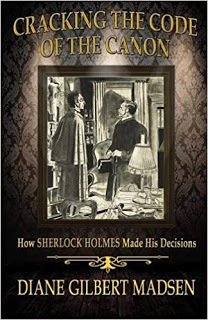
One of these categorizations Madsen makes is grouping the criminals in the Canon. She groups them into "Super Villains," "Exceptional Female Villainesses" and "Demi Villains." For whatever reason, I had just gone down an internet rabbit hole and spent the previous night reading about a group of Spider-Man super villains named The Sinister Six. And, because I'm apt to let my mind run rampant with connecting Sherlock Holmes to unrelated things, I spent some time thinking, who would Sherlock Holmes' Sinister Six be?
Spider-Man's Sinister Six was almost spearheaded by the evil genius, Doctor Octopus, and was typically bent on revenge against the hero. So, using that same framework, I decided that Sherlock's Sinister Six would all have to join together after their respective bouts with Holmes, so anyone that dies in their story would automatically be out.
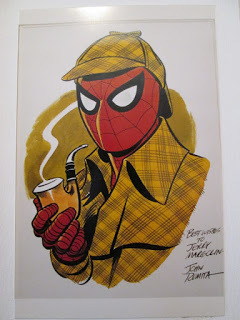
Madsen lists Professor Moriarty, Colonel Moran, John Clay and Baron Gruner as her super villains. I think Moriarty and Moran are shoo ins, due to their being the only villains to appear in more than one story, and their history of working together. Moriarty is obviously the criminal genius in this situation, recruiting others to form this made up team of super villains.
British behavior will be expected in this group, so I think we have to rule Gruner out. I don't see him as one who would work well with others, anyway.
Victorian society was very concerned with class, so if this is a team that will be meeting and working behind their public personae, we are probably going to want to keep membership to the genteel class, that way no suspicions would arise when Moran plays cards with one of the members in his club, or a member visits Moriarty at his university office. John Clay attended Eton and Oxford, is the fourth smartest man in London, is the third most daring, and has royal blood. If he escaped prison after being pulled out of that tunnel, I think we have our third member.
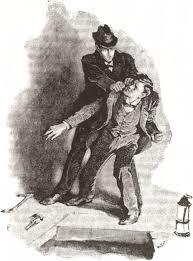
But you know who wouldn't have to escape from prison? Our next three members, Jephro Rucastle, Sir George Burnwell and James Wilder. Three villains who all have a reason to want revenge on Holmes yet never went to prison for their crimes.
After Rucastle's first run-in with The Great Detective, he was left broken, mangled, and without his daughter's income. Unable to leave the house, he has spent his time learning - no, obsessing - about his revenge on Sherlock Holmes. Imagine his one interaction with Holmes from Rucastle's point of view: he returned home, found his daughter had escaped, a stranger in her room, and when Rucastle tried to protect his home, his own mastiff turned on him, only to be shot and killed by the stranger's accomplice. Jephro Rucastle is a man bent on revenge.
Sir George Burnwell had a fortune literally ripped from his hands in The Beryl Coronet. Try as he may, he couldn't overpower Sherlock Holmes, and was forced to flee to freedom with his amor, Mary. Whether they stayed together is anyone's guess. But we can be sure that Burnwell wants his revenge on Holmes.
Wilder has every reason to hate Holmes. He's already prone to hate; just look at how he feels about his stepbrother. Holmes shows up, ruins his kidnapping scheme, gets his partner put in jail and Wilder gets shipped off to Australia. Wilder could have found his fortune there, and is spurred on by his hatred for Holmes, that when he comes back to England, he is flush with cash, a (dubious) inroad to the peerage, and would be a perfect recruit for Moran to bring in under his wing.
These six villains have plenty of reasons to wish the end of Sherlock Holmes. The Great Detective should probably be thankful that they never crossed paths...
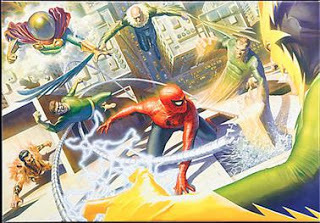
P.S. As I went through the list of villains, from Madsen's book, some other names jumped out at me as people who would want revenge on Holmes, but had to be discounted for other reasons. So, here is my list of honorable mentions.
Richard Brunton (MUSG) Pro: very intelligent Con: deadCharles Augustus Milverton (CHAS) Pro: inroads with many powerful families Con: deadHugo Oberstein (BRUC) Pro: meticulous planning Con: nobody trusts a spyAbe Slaney (DANC) Pro: works well in criminal organization Con: AmericanVon Bork (LAST) Pro: good wine Con: no one wants to work with someone working against EnglandIsadora Klein (3GAB) Pro: has her husband's money to spend Con: SpanishKiller Evans (3GAR) Pro: has a counterfeiting press Con: AmericanJack Ferguson - (SUSS) Pro: Plots out in advance Con: too youngCount Sylvius (MAZA) Pro: part of upper society Con: probably just Moran anyway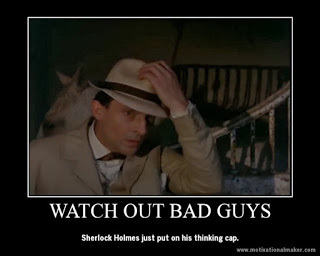

One of these categorizations Madsen makes is grouping the criminals in the Canon. She groups them into "Super Villains," "Exceptional Female Villainesses" and "Demi Villains." For whatever reason, I had just gone down an internet rabbit hole and spent the previous night reading about a group of Spider-Man super villains named The Sinister Six. And, because I'm apt to let my mind run rampant with connecting Sherlock Holmes to unrelated things, I spent some time thinking, who would Sherlock Holmes' Sinister Six be?
Spider-Man's Sinister Six was almost spearheaded by the evil genius, Doctor Octopus, and was typically bent on revenge against the hero. So, using that same framework, I decided that Sherlock's Sinister Six would all have to join together after their respective bouts with Holmes, so anyone that dies in their story would automatically be out.

Madsen lists Professor Moriarty, Colonel Moran, John Clay and Baron Gruner as her super villains. I think Moriarty and Moran are shoo ins, due to their being the only villains to appear in more than one story, and their history of working together. Moriarty is obviously the criminal genius in this situation, recruiting others to form this made up team of super villains.
British behavior will be expected in this group, so I think we have to rule Gruner out. I don't see him as one who would work well with others, anyway.
Victorian society was very concerned with class, so if this is a team that will be meeting and working behind their public personae, we are probably going to want to keep membership to the genteel class, that way no suspicions would arise when Moran plays cards with one of the members in his club, or a member visits Moriarty at his university office. John Clay attended Eton and Oxford, is the fourth smartest man in London, is the third most daring, and has royal blood. If he escaped prison after being pulled out of that tunnel, I think we have our third member.

But you know who wouldn't have to escape from prison? Our next three members, Jephro Rucastle, Sir George Burnwell and James Wilder. Three villains who all have a reason to want revenge on Holmes yet never went to prison for their crimes.
After Rucastle's first run-in with The Great Detective, he was left broken, mangled, and without his daughter's income. Unable to leave the house, he has spent his time learning - no, obsessing - about his revenge on Sherlock Holmes. Imagine his one interaction with Holmes from Rucastle's point of view: he returned home, found his daughter had escaped, a stranger in her room, and when Rucastle tried to protect his home, his own mastiff turned on him, only to be shot and killed by the stranger's accomplice. Jephro Rucastle is a man bent on revenge.
Sir George Burnwell had a fortune literally ripped from his hands in The Beryl Coronet. Try as he may, he couldn't overpower Sherlock Holmes, and was forced to flee to freedom with his amor, Mary. Whether they stayed together is anyone's guess. But we can be sure that Burnwell wants his revenge on Holmes.
Wilder has every reason to hate Holmes. He's already prone to hate; just look at how he feels about his stepbrother. Holmes shows up, ruins his kidnapping scheme, gets his partner put in jail and Wilder gets shipped off to Australia. Wilder could have found his fortune there, and is spurred on by his hatred for Holmes, that when he comes back to England, he is flush with cash, a (dubious) inroad to the peerage, and would be a perfect recruit for Moran to bring in under his wing.
These six villains have plenty of reasons to wish the end of Sherlock Holmes. The Great Detective should probably be thankful that they never crossed paths...

P.S. As I went through the list of villains, from Madsen's book, some other names jumped out at me as people who would want revenge on Holmes, but had to be discounted for other reasons. So, here is my list of honorable mentions.
Richard Brunton (MUSG) Pro: very intelligent Con: deadCharles Augustus Milverton (CHAS) Pro: inroads with many powerful families Con: deadHugo Oberstein (BRUC) Pro: meticulous planning Con: nobody trusts a spyAbe Slaney (DANC) Pro: works well in criminal organization Con: AmericanVon Bork (LAST) Pro: good wine Con: no one wants to work with someone working against EnglandIsadora Klein (3GAB) Pro: has her husband's money to spend Con: SpanishKiller Evans (3GAR) Pro: has a counterfeiting press Con: AmericanJack Ferguson - (SUSS) Pro: Plots out in advance Con: too youngCount Sylvius (MAZA) Pro: part of upper society Con: probably just Moran anyway

Published on June 25, 2018 21:10



